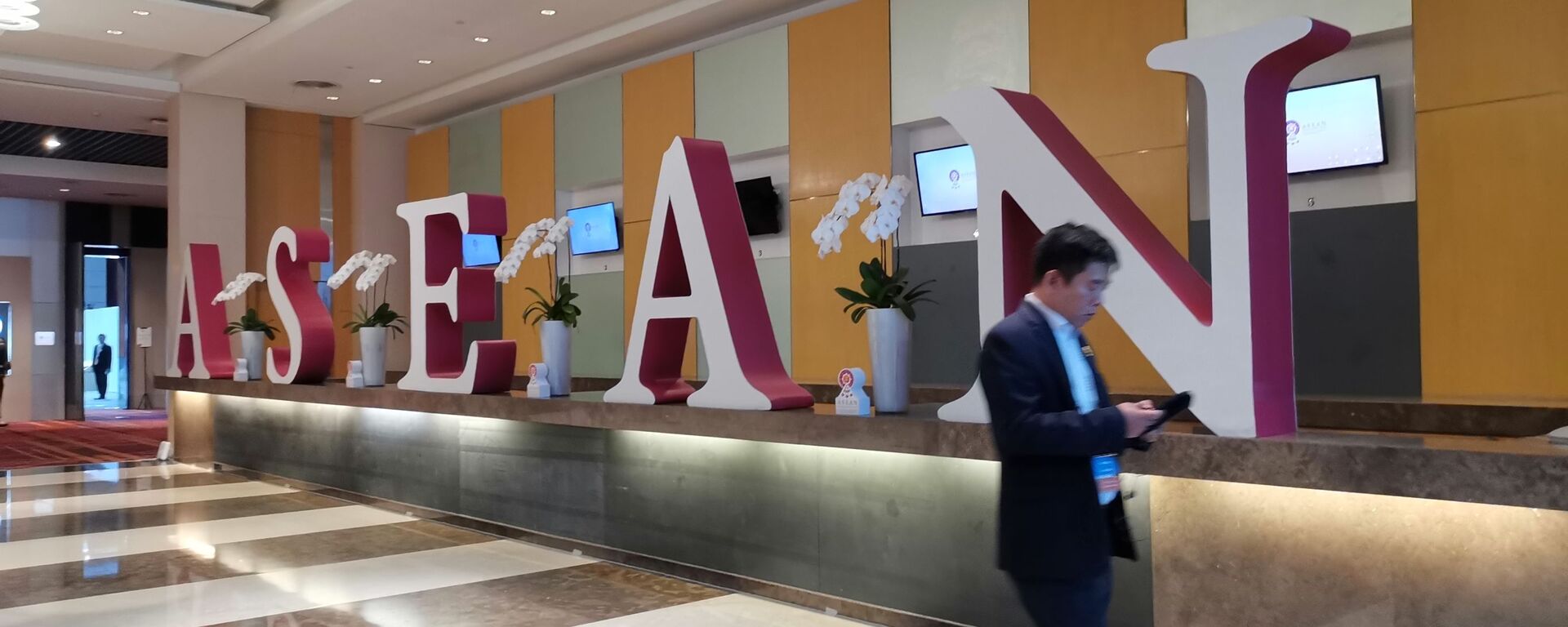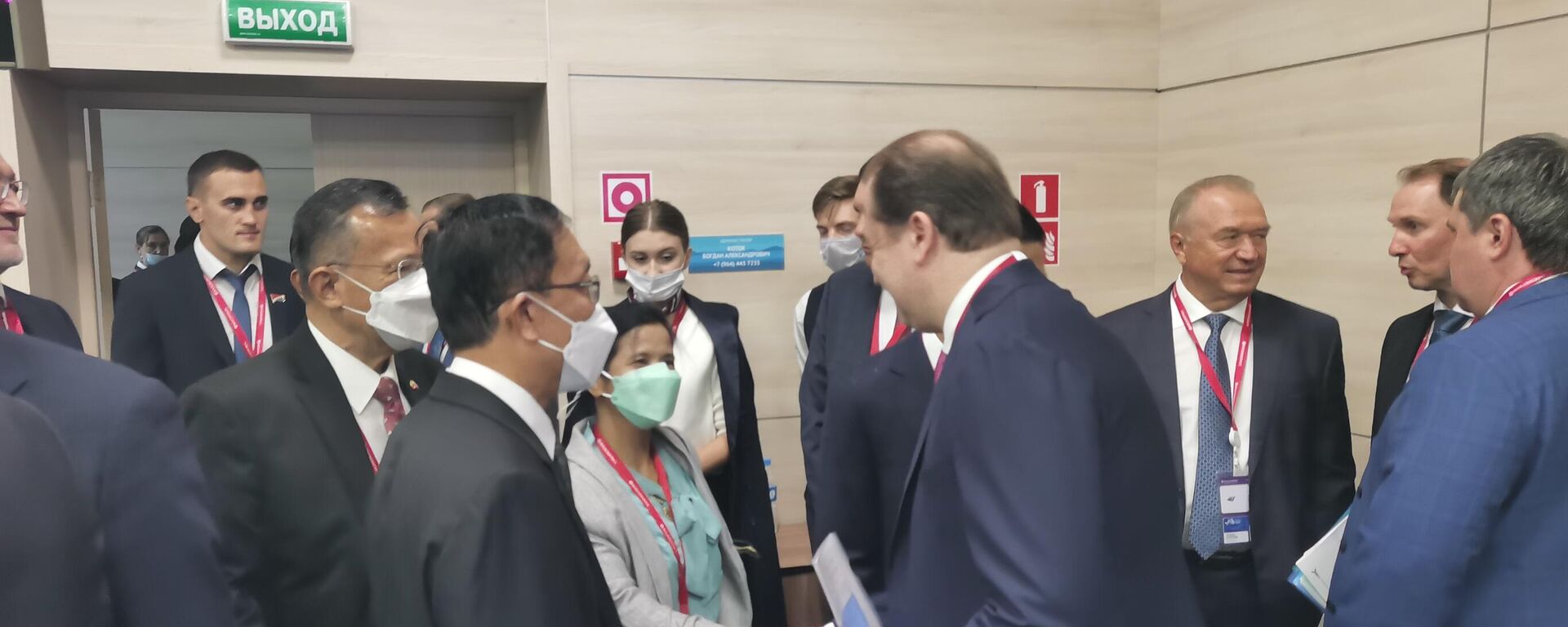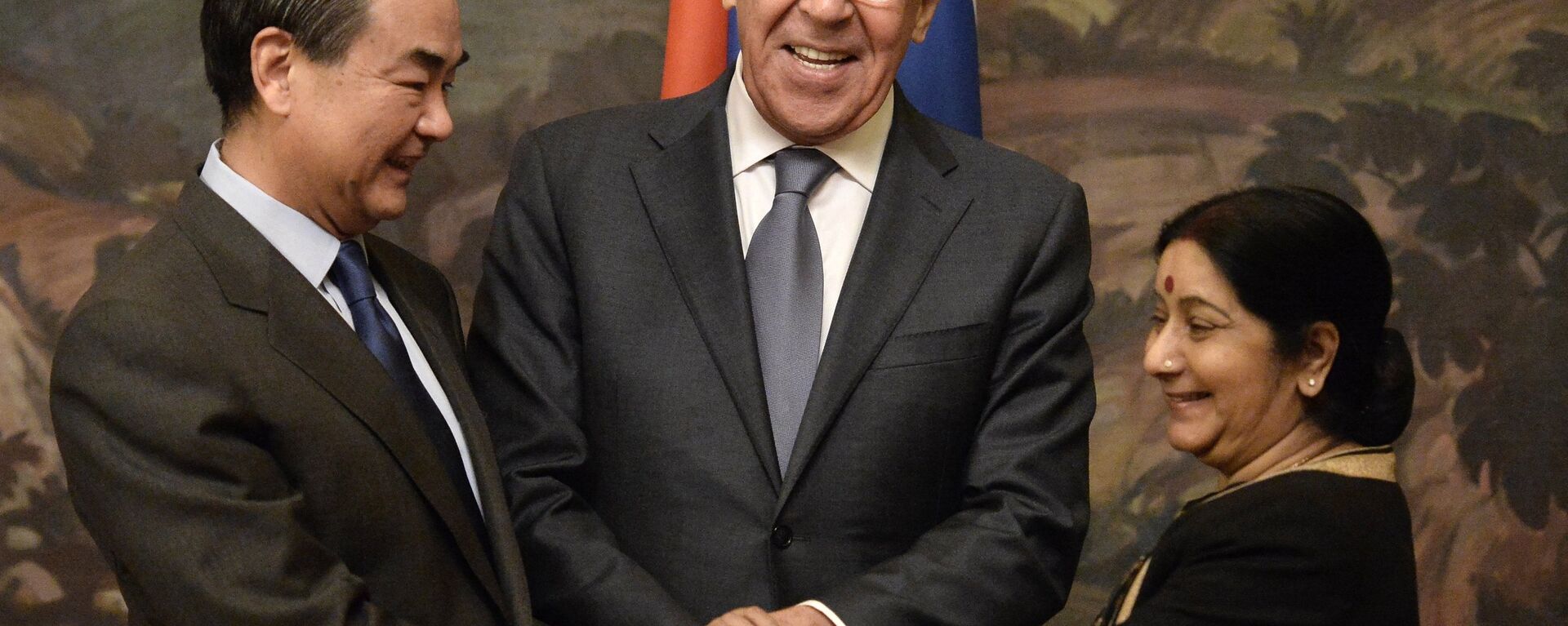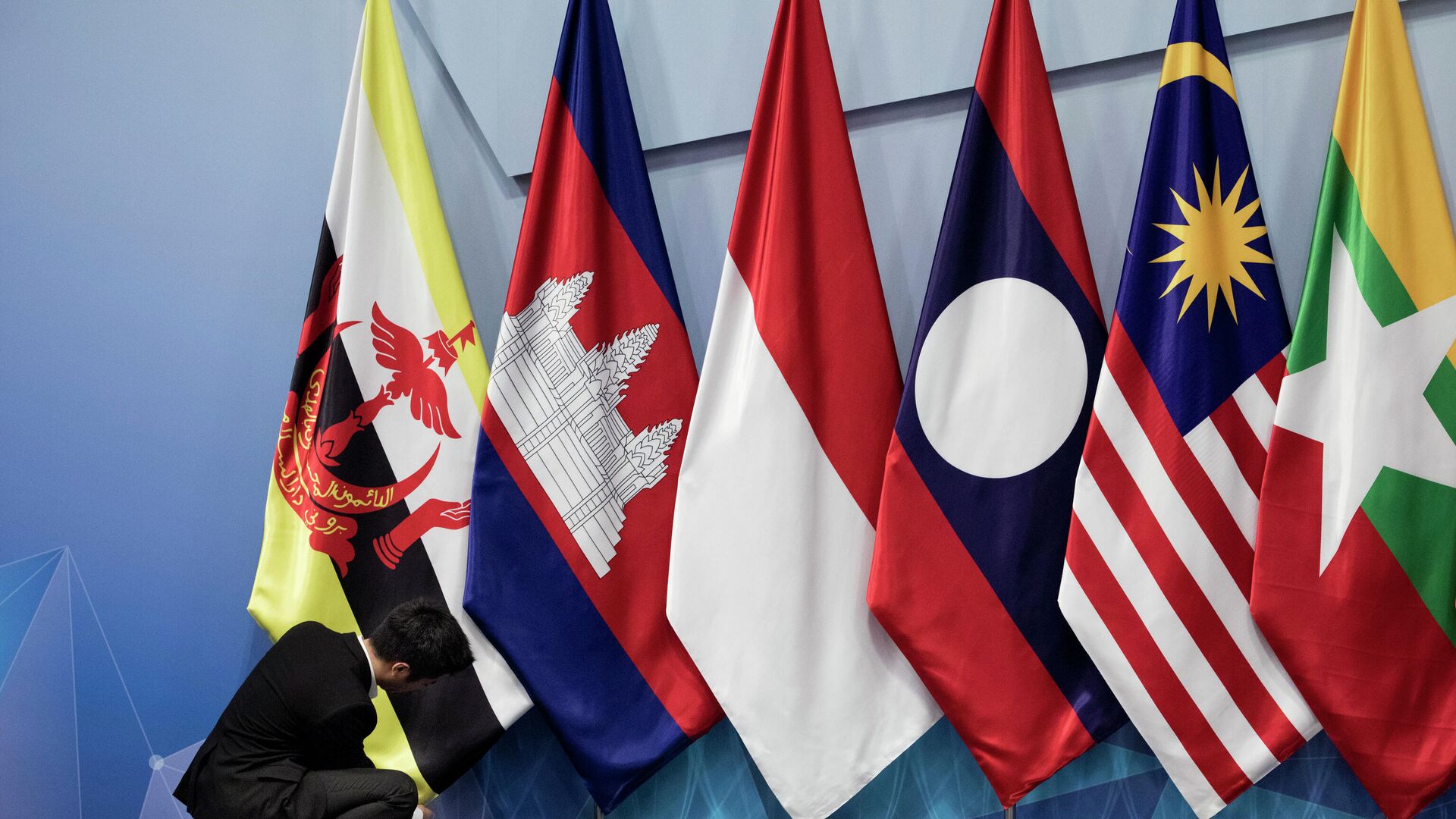https://sputnikglobe.com/20221112/east-timors-accession-how-asean-is-expanding-amid-global-shift-to-multi-polarity-1104049130.html
East Timor's Accession: How ASEAN is Expanding Amid Global Shift to Multi-Polarity
East Timor's Accession: How ASEAN is Expanding Amid Global Shift to Multi-Polarity
Sputnik International
Leaders of the Association of Southeast Asian Nations (ASEAN) agreed in principle on November 11 to admit East Timor as the 11th member. Prior to obtaining a... 12.11.2022, Sputnik International
2022-11-12T10:11+0000
2022-11-12T10:11+0000
2022-11-12T10:11+0000
analysis
asean
china
asia
regional comprehensive economic partnership (rcep)
economic development
indonesia
timor-leste (east timor)
https://cdn1.img.sputnikglobe.com/img/07e5/0a/1c/1090265635_0:0:3071:1728_1920x0_80_0_0_9061995c7bb8a82b4be582e0183c70b5.jpg
"The last time ASEAN admitted a new member was in 1999 when Cambodia joined the group; for that alone the acceptance of Timor-Leste is notable," Jay Batongbacal, director at the University of the Philippines Institute for Maritime Affairs and Law of the Sea, told Sputnik.East Timor, or the Democratic Republic of Timor-Leste, is a Southeast Asian nation which comprises the eastern half of the island of Timor, the Oecusse exclave (Timor's Special Administrative Region), and the minor islands of Atauro and Jaco. East Timor had been a Portuguese colony until 1975 and then was invaded by Indonesia. The small nation managed to gain independence only in 2002.Technically, East Timor – a nation of 1.37 million people – was considered an ASEAN participant while being part of Indonesia. Almost a decade after gaining sovereignty the republic applied for membership in the bloc in 2011. At that time Dili outlined the 2011 Timor-Leste Strategic Development Plan which set a goal of becoming a full ASEAN member by 2015.ASEAN was formed by five member states in 1967 - Singapore, Malaysia, Indonesia, Thailand and the Philippines. One of the bloc's criteria for membership is recognition by other participants. However, a number of ASEAN states have long been skeptical about East Timor's accession to the bloc. Some bloc members expressed concerns about Timor-Leste’s economic and political prospects, while others considered Dili a "Trojan horse" given its growing ties with Beijing.ASEAN's principle decision to admit East Timor as a new member coincided with strategic US-China competition in Asia Pacific, as well as formation and strengthening of regional trade blocs in rapidly developing Asia.According to the World Economic Forum's estimates, ASEAN is on-track to become the fourth-largest economy in the world. Despite the pandemic-related global economic slowdown, the bloc remained an attractive investment destination: the region's share of foreign direct investment (FDI) from 11.9% in 2019 to 13.7% in 2020.In addition to that, the value of international project finance in ASEAN has risen twice from an annual average of $37 billion in 2015–2017 to an annual average of $74 billion in 2018–2020, according to the WEF. It is expected that the regional economy will grow by 4% to 5% annually over the next 10 years thus making it a profitable investment destination amid the unfolding recession in the West.Furthermore, the ASEAN-led Regional Comprehensive Economic Partnership (RCEP) came into effect on January 1, 2022. The endeavor is a free trade agreement among the Asia-Pacific nations of Australia, Brunei, Cambodia, China, Indonesia, Japan, South Korea, Laos, Malaysia, Myanmar, New Zealand, the Philippines, Singapore, Thailand, and Vietnam. According to some estimates, RCEP countries account for about 30% of the world's population (2.2 billion people) and 30% of global GDP ($29.7 trillion), thus making it the largest trade bloc in history."ASEAN was established originally as a means to create a regional community as a means to promote peace and cooperation in the 1970s, and since that time has done relatively better in keeping the peace, encouraging economic integration and coordination," emphasized Batongbacal.Like any other multinational bloc, ASEAN faces a lot of challenges with regard to its consensus-based decision-making, dialogue process, and diverse political, economic, social, and cultural interests, according to the scholar.
https://sputnikglobe.com/20221111/asean-reportedly-ready-to-accept-east-timor-as-11th-member-1104007283.html
https://sputnikglobe.com/20220906/business-council-chairman-asean-focused-on-russian-energy-supplies-hi-tech-cooperation-is-possible-1100445987.html
https://sputnikglobe.com/20210121/beijing-to-grow-free-trade-network-with-intl-partners-amid-rcep-deal-chinas-foreign-ministry-says-1081838273.html
china
indonesia
timor-leste (east timor)
Sputnik International
feedback@sputniknews.com
+74956456601
MIA „Rossiya Segodnya“
2022
News
en_EN
Sputnik International
feedback@sputniknews.com
+74956456601
MIA „Rossiya Segodnya“
Sputnik International
feedback@sputniknews.com
+74956456601
MIA „Rossiya Segodnya“
east timor, asean, 11th member of asean, indonesia, asia pacific, rcep, china, foreign investments, free trade zones, regional trade bloc
east timor, asean, 11th member of asean, indonesia, asia pacific, rcep, china, foreign investments, free trade zones, regional trade bloc
East Timor's Accession: How ASEAN is Expanding Amid Global Shift to Multi-Polarity
Leaders of the Association of Southeast Asian Nations (ASEAN) agreed in principle on November 11 to admit East Timor as the 11th member. Prior to obtaining a full membership, the half-island nation will be granted observer status and will be allowed to participate in the bloc's meetings.
"The last time ASEAN admitted a new member was in 1999 when Cambodia joined the group; for that alone
the acceptance of Timor-Leste is notable," Jay Batongbacal, director at the University of the Philippines Institute for Maritime Affairs and Law of the Sea, told Sputnik.
East Timor, or the Democratic Republic of Timor-Leste, is a Southeast Asian nation which comprises the eastern half of the island of Timor, the Oecusse exclave (Timor's Special Administrative Region), and the minor islands of Atauro and Jaco. East Timor had been a Portuguese colony until 1975 and then was invaded by Indonesia. The small nation managed to gain independence only in 2002.
Technically, East Timor – a nation of 1.37 million people – was considered an ASEAN participant while being part of Indonesia. Almost a decade after gaining sovereignty the republic applied for membership in the bloc in 2011. At that time Dili outlined the 2011 Timor-Leste Strategic Development Plan which set a goal of becoming a full ASEAN member by 2015.

11 November 2022, 08:37 GMT
ASEAN was formed by five member states in 1967 - Singapore, Malaysia, Indonesia, Thailand and the Philippines. One of the bloc's criteria for membership is recognition by other participants. However, a number of ASEAN states have long been skeptical about East Timor's accession to the bloc. Some bloc members expressed concerns about Timor-Leste’s economic and political prospects, while others considered Dili a
"Trojan horse" given its growing ties with Beijing.
"Acceptance of Timor-Leste is a logical step toward this, in the sense that (a) Timor-Leste is geographically part of Southeast Asia, and (b) a larger membership that includes all the Southeast Asian States is necessary for ASEAN to fully represent the region," explained Batongbacal.
ASEAN's principle decision to admit East Timor as a new member coincided with strategic US-China competition in Asia Pacific, as well as formation and strengthening of regional trade blocs in rapidly developing Asia.

6 September 2022, 13:46 GMT
"Recently, the ASEAN also announced 'community building process' in economic, cultural and security domains. ASEAN also entered into Free Trade Zones with China, India, the Regional Comprehensive Economic Partnership (RCEP) and others," said Srikanth Kondapalli, the Dean of School of International Studies at Jawaharlal Nehru University, New Delhi, India.
According to the World Economic Forum's estimates, ASEAN is on-track to become the fourth-largest economy in the world. Despite the pandemic-related global economic slowdown, the bloc remained an attractive investment destination: the region's share of foreign direct investment (FDI) from 11.9% in 2019 to 13.7% in 2020.
In addition to that, the value of international project finance in ASEAN has risen twice from an annual average of $37 billion in 2015–2017 to an annual average of $74 billion in 2018–2020, according to the WEF. It is expected that the regional economy will grow by 4% to 5% annually over the next 10 years thus making it a profitable investment destination amid the unfolding recession in the West.

21 January 2021, 12:51 GMT
Furthermore, the ASEAN-led Regional Comprehensive Economic Partnership (RCEP) came into effect on January 1, 2022. The endeavor is a free trade agreement among the Asia-Pacific nations of Australia, Brunei, Cambodia, China, Indonesia, Japan, South Korea, Laos, Malaysia, Myanmar, New Zealand, the Philippines, Singapore, Thailand, and Vietnam. According to some estimates, RCEP countries account for about 30% of the world's population (2.2 billion people) and 30% of global GDP ($29.7 trillion), thus making it the largest trade bloc in history.
"ASEAN was established originally as a means to create a regional community as a means to promote peace and cooperation in the 1970s, and since that time has done relatively better in keeping the peace, encouraging economic integration and coordination," emphasized Batongbacal.
Like any other multinational bloc, ASEAN faces a lot of challenges with regard to its consensus-based decision-making, dialogue process, and diverse political, economic, social, and cultural interests, according to the scholar.
"As an organization, it is very much aware of the pressures and challenges it faces, but is still evolving its ability to unify and act decisively as a single entity against external powers," Batongbacal concluded.





